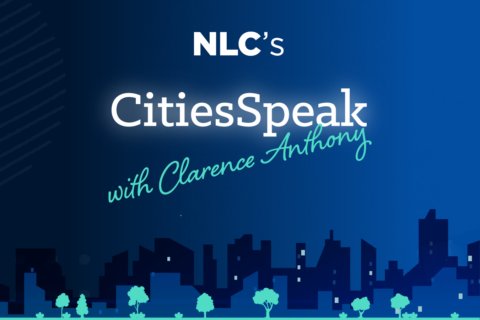Political action in our country often appears to move in a trickle-down direction: The Supreme Court issues a decision that affects changes in every state; Congress passes a law that applies to all Americans; the President signs an Executive Order that can change national policy the moment ink touches paper.
In reality, everything that happens at the federal level is influenced by the granular developments in our neighborhoods, cities and states. For instance, marriage equality began in a city, moved to states and finally – more than a decade after San Francisco paved the way – it was legalized nationally.
It makes sense that political progress should percolate up, as it is intended to represent the interests of our lived experiences. Local politicians cannot ignore their constituents’ needs because we live in and serve in our communities – we must answer for our decisions not only in elections but at the grocery store, at our kids’ soccer games, in line to get a coffee. Every day is instructive in the challenges people face, and how government can do better.
We’ve all committed to join forces in pursuit of economic security for all Americans – from exploring guaranteed income programs in our respective cities to working with our national counterparts to enact cash-based policies for the entire country.
I was born and raised in the city I was elected to lead, and I am acutely aware of the struggles shared by too many of my city’s residents – namely, that a full-time job no longer provides the stability it once did. As a majority BIPOC (Black, Indigenous, People of Color) city, our country’s racial wealth and income gaps coupled with the disproportionate effects of coronavirus on non-white populations has only further exacerbated financial fragility. Our median income is nearly $30,000 less than that of residents across the bay in San Francisco, and almost $10,000 less than California’s median. Meanwhile, the cost of living continues to rise, and our proximity to the much bigger paychecks of San Francisco means rents are dropping there while they rise here – further increasing the financial burden of long-time residents already stretched too thin. People are working, often multiple jobs, but still finding it impossible to stay afloat, much less get ahead.
The policy solutions to economic instability have been debated endlessly in this country for years – from paternalistic programs designed to punish more than help to others focused more on what think tanks find interesting rather than what actually provides the most benefit for those in need. The truth is, solutions need not be complex to solve a simple problem: when people don’t have enough money, give them some. I’ve long understood the power of guaranteed cash, with Oakland’s Brilliant Baby program including a $500 savings account to recipients.
Now, I’m joining with 12 other mayors as part of the newly-formed Mayors for a Guaranteed Income initiative. We’ve all committed to join forces in pursuit of economic security for all Americans – from exploring guaranteed income programs in our respective cities to working with our national counterparts to enact cash-based policies for the entire country.

We already know cash works – just an hour east of Oakland, a pilot has been underway for more than a year providing a $500 monthly guaranteed income to a group of residents in Stockton, CA. Early results show that the cash has been a lifeline to cover basic expenses, particularly as the pandemic hit. Spending on food went up as residents prepared to shelter-in-place, with recipients reporting the money allowed them to stock their shelves when they’d typically be on an unforgiving budget. One recipient was in the process of getting his security clearance for a full-time job at the airport when the pandemic hit and put a halt to the hiring process. Suddenly finding himself out of work and not yet receiving any jobless benefits, the guaranteed income is his sole financial fallback right now.
Further north, the state of Alaska has been giving out a form of a guaranteed income to all residents for nearly four decades through its oil-revenue program, the Alaska Permanent Fund Dividend. Adding up to several thousand dollars a year for a family of four, the PFD has helped create an economy with some of the lowest levels of income inequality in the country and has not stopped people from working.
Aside from the data proving its efficacy, we also have a moral imperative to provide economic stability to our constituents; particularly in our current national moment demanding an end to systemic racism, much of which has been perpetuated through economic policies that have left us with a shameful racial wealth gap in which a white family has 10 times the wealth of a Black family. For its outsized positive effects on BIPOC, a guaranteed income has long been a step toward equity in the racial justice movement – including support from Dr. Martin Luther King, Jr., the National Welfare Rights Organization, and the current Movement for Black Lives.
As mayor, it’s also my responsibility to provide a budget, and that’s an important part of this conversation. Stockton’s program and a similar one in Jackson, MS, are both fully-funded by philanthropic dollars. Part of our efforts at Mayors for a Guaranteed Income will be fundraising for pilots and task forces in our respective cities. In fact, we’ve already secured a donation of $3 million from Twitter and Square CEO Jack Dorsey. At the federal level, several equitable funding measures are possible – from reversing Trump’s corporate tax giveaways to bringing income taxes on the very wealthiest Americans into line with rates during much of the 20th century.
We are on the precipice of a great shift in this country and elected officials like me bear the responsibility of ensuring we do not return to the status quo that has left far too many of us behind. In supporting guaranteed income, I hear my constituents’ demands for change, and I join them in their calls for a new system that allows us all the opportunity to thrive.









